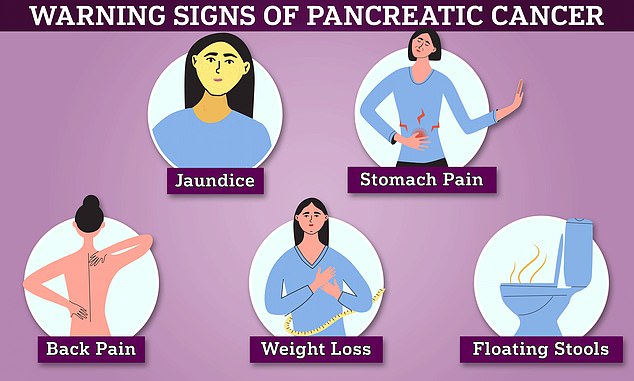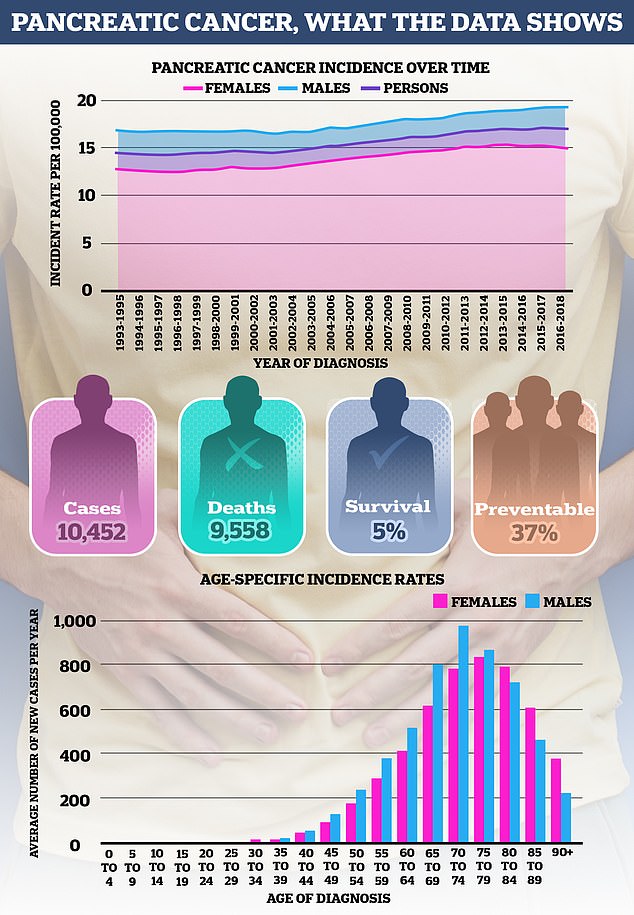Fit and healthy mum, 43, killed by fatal pancreatic cancer after strange symptom mistaken for food intolerance
A fit and healthy mother was told by doctors that her stomach problems were due to food intolerances and irritable bowel syndrome, but that it was the deadliest form of cancer.
Emma King, from Maidstone, regularly attended her running clubs and exercise classes, but in 2017 she suffered from persistent digestive and stomach problems.
The then 40-year-old sought help from her GP, who told her the symptoms were likely due to relatively minor food intolerances.
Emma’s sister Hayley Penfold, 51, said The sun: ‘She was back and forth with the doctors who told her to keep a food diary and attributed it to multiple food intolerances, IBS symptoms and wheat sensitivity.’
However, she also lost weight – a classic sign of cancer.
Despite this, Ms Penfold said no one suggested her sister should have a scan.
After battling the symptoms for two years, Emma was finally sent for a scan in August 2019.
This revealed the devastating cause of her problems: a growth on her pancreas that was confirmed to be cancer that had also spread to her liver.
Emma King (left) from Maidstone regularly attended her running clubs and exercise classes, but suffered from persistent digestive and stomach problems in 2017
Pancreatic cancer is one of the deadliest forms of the disease, partly because of subtle symptoms that are harder to spot until the later, harder-to-treat stages.
Only one in twenty diagnosed patients is expected to survive ten years after diagnosis.
Emma promptly started chemotherapy and despite having to go to hospital with pneumonia in December, she managed to get home for Christmas.
Sadly, plans for a family trip with Emma, her husband Nick and their three children to Disneyland Paris and then Lapland UK both had to be canceled as her condition worsened.
As 2020 drew to a close, Emma’s health continued to deteriorate, with lumps in her back in October and November.
Soon after, the chemotherapy and hormone injections that made up her cancer treatment began to be ineffective.
Then, on January 4, 2021, the family received the devastating news that Emma only had about a week to live.
She died on January 11 – a year and a half after her diagnosis – with her mother, stepfather and Nick by her side.
Hayley said she hoped sharing her sister’s story would help others spot any signs of pancreatic cancer early.

Pancreatic cancer is also called a ‘silent killer’ because of its subtle symptoms that are often not noticed until too late

Pancreatic cancer remains one of the least survivable forms of the disease and is increasing alarmingly. Source for data: Cancer Research UK
“Emma was a remarkable woman whose battle with pancreatic cancer touched countless lives,” she said.
‘Before her diagnosis, Emma lived life to the fullest. She was known for her caring nature and dedication to helping others.”
Hayley also shared Emma’s experience as part of the ‘Give It Up for PanCan’ campaign.
This runs until January and encourages participants to give up a personal indulgence such as alcohol, chocolate and social media for a month to show support for those affected by pancreatic cancer, as well as raise money for the charity Pancreatic Cancer Action.
Almost 11,000 cases of pancreatic cancer are diagnosed in Britain every year, with 9,500 deaths, equivalent to one Briton dying from the disease every hour.
The pancreas is a tadpole-shaped organ about 25 cm long, located just behind the stomach, and is part of the digestive system.
It helps produce enzymes that help the body break down food into nutrients it needs.
The organ also makes hormones that are responsible for regulating blood sugar levels in the body.
Possible symptoms of pancreatic cancer include jaundice, where the whites of the eyes and skin turn yellow, in addition to itchy skin, darker urine and paler poop.
Other possible symptoms include loss of appetite, unintentional weight loss, constipation or bloating.
Although many of these symptoms are unlikely to be cancer, it is important to get them checked early by a GP to be sure, especially if people have had them for more than four weeks.
Last year, experts warned of an alarming rise in pancreatic cancer rates among young women, and more research into the disease was needed.
